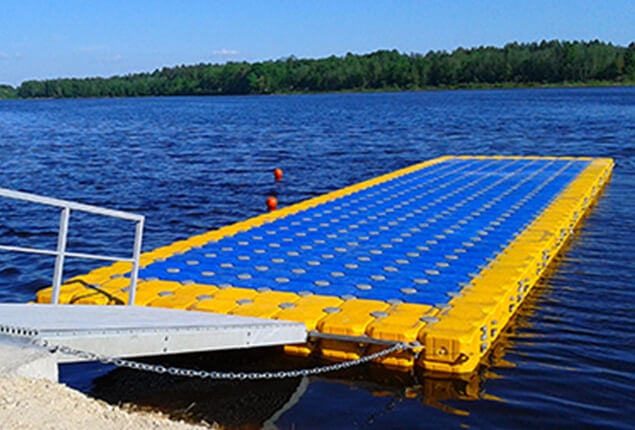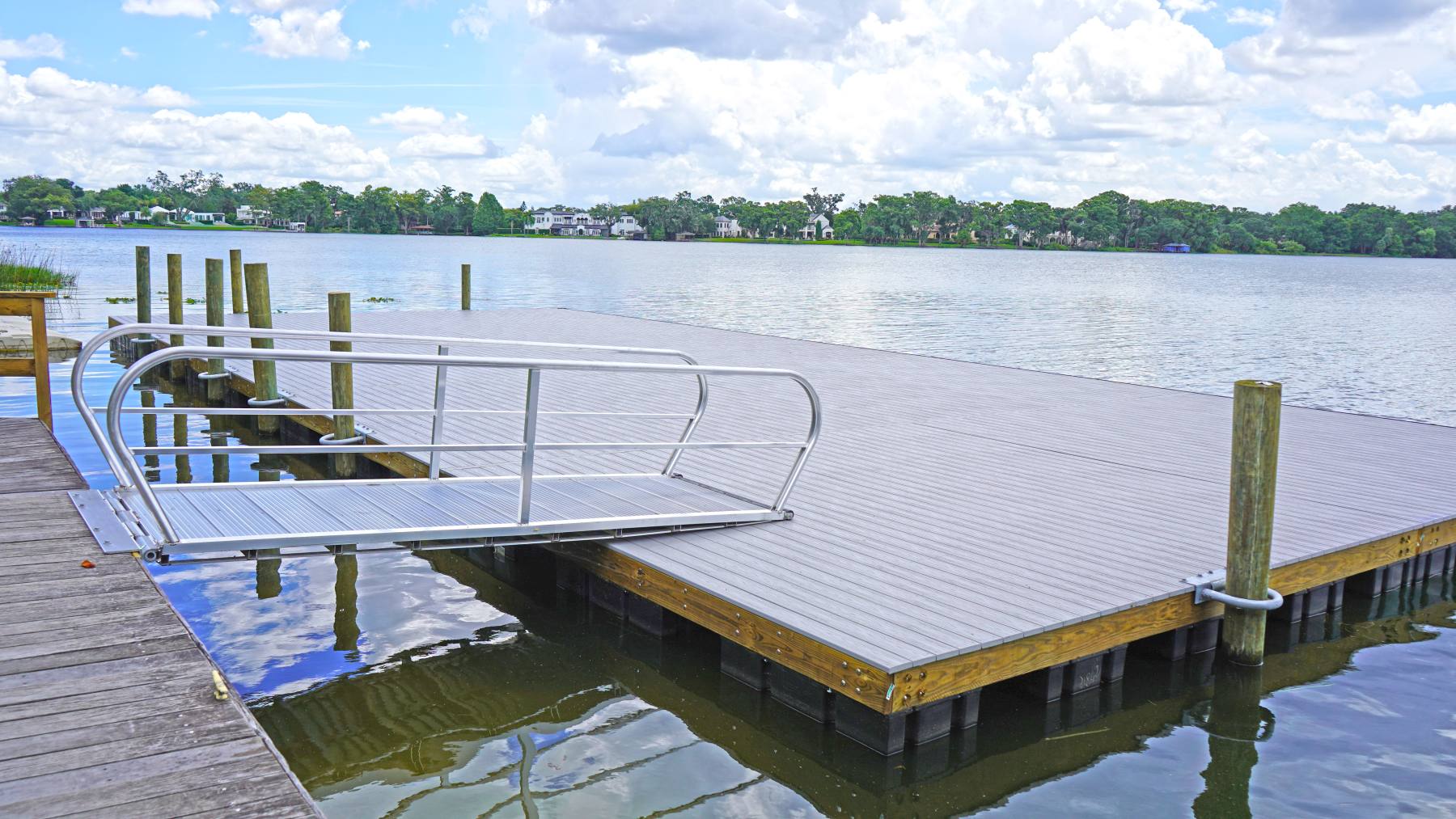Floating Docks: The Smart Selection for Modern Waterside Living and Leisure
Floating Docks: The Smart Selection for Modern Waterside Living and Leisure
Blog Article
Floating Docks: The Suitable Option for Versatile Water Access
Floating docks existing a compelling option for a selection of water accessibility needs, providing versatility that transcends typical mooring choices. Their ability to adapt to changing water degrees while making certain stability and safety makes them particularly advantageous for both business and leisure applications. The modular nature of floating docks assists in customization, providing to certain requirements. However, the nuances of installation and upkeep, together with the series of applications, call for a closer examination to totally appreciate their potential benefits and effects for waterway gain access to techniques.
Advantages of Floating Docks
Floating docks offer countless benefits that enhance water gain access to for numerous applications. Their capability to fluctuate with changing water levels makes them especially helpful in settings with fluctuating tides or seasonal variants. This versatility makes certain that vessels can conveniently tie without worry for the water's depth, giving a trusted system for recreational, commercial, and industrial usages.
Additionally, floating docks are typically built from long lasting materials that stand up to rust, making them ideal for lasting usage in marine atmospheres. Their setup is generally much less invasive than conventional fixed docks, decreasing the ecological impact and promoting quicker implementation (floating dock company). This flexibility permits much easier relocation or reconfiguration according to individual needs or ecological modifications
Security is one more essential advantage; floating docks can offer steady access for individuals disembarking or boarding from watercrafts and minimize the danger of crashes related to unpredictable surfaces. They can be developed to accommodate a selection of devices, such as cleats and fenders, boosting performance. Generally, floating docks stand for a reliable solution for improving water accessibility across diverse industries while promoting safety and environmental sustainability.

Sorts Of Floating Docks
Numerous kinds of floating docks accommodate different requirements and atmospheres, each created with certain attributes to enhance functionality. The most typical types include modular docks, which are composed of interlacing areas that permit easy customization and growth. These docks are optimal for entertainment usage, as they can be customized to fit different watercraft dimensions and water problems.
An additional popular choice is the stationary floating dock, which stays anchored in location yet floats with changing water degrees. dock company. This kind is especially fit for areas with minimal tidal variations, offering steady access for angling or swimming. Furthermore, there are drive-on docks, which include a sloped design that permits boats to quickly drive on and off, making them suitable for individual watercraft and smaller sized vessels
For industrial applications, durable floating docks are available, created from strengthened products to endure considerable tons and harsh aquatic settings. Lastly, environment-friendly floating docks utilize lasting materials and layouts to minimize environmental influence, usually incorporating features like plants to sustain neighborhood wild animals. Understanding the various sorts of floating docks makes sure that individuals can select the most suitable service for their certain demands.
why not try these out
Setup Process Introduction
An effective installment of floating docks needs careful preparation and focus to information to make sure optimum performance and security. The first step involves examining the website conditions, including water deepness, current, and potential barriers. This analysis informs the selection of the proper dock products and design customized to the specific setting.
Following, acquiring needed permits is essential, as lots of jurisdictions have guidelines concerning building on water bodies. The setup can proceed as soon as permissions are protected. Begin by preparing the foundation, which might entail anchoring systems or pilings customized to the dock type and regional problems.
Following the structure setup, set up the dock sections according to producer specs. Make certain that all elements are firmly fastened and aligned to endure ecological tensions. Setting the dock in the assigned location, guaranteeing it is level and steady.

Upkeep Tips and Ideal Practices
After the installment procedure is total, ongoing maintenance plays an important function in guaranteeing the longevity and capability of floating docks. Routine examinations must be performed to identify any kind of signs of damage, wear, or deterioration - floating dock company. Inspect for any kind of loosened fittings, fractures, or splitting up in the dock areas, as these can compromise architectural stability
Cleansing the dock is important to eliminate debris, algae, and various other build-up that can impact its appearance and safety. Make use of a gentle pressure wash occasionally to preserve tidiness without causing damages to the surface area. Furthermore, using a safety sealant every few years can help boost durability and withstand ecological wear.
Take notice of the mooring lines and anchors, guaranteeing they are free and secure from corrosion. Replace any type of abject parts immediately to prevent risks. Seasonal modifications might additionally be essential; throughout severe climate condition, reinforcing the dock or repositioning can protect against damages.
Applications for Floating Docks
Floating docks serve a multitude of applications, providing to both business and recreational requirements. In leisure setups, they offer smooth access to waterways for tasks such as boating, angling, and swimming. Their adjustable nature read this article permits installation in differing water degrees, making certain secure and secure accessibility no matter tidal variations.
Readily, floating docks are indispensable for marinas and waterfront companies. They help with the docking of vessels, allowing reliable filling and discharging of products. Their modular design permits easy development or reconfiguration to accommodate transforming company needs, making them perfect for boat leasings, scenic tour operations, or fishing charters.
Furthermore, floating docks are used in ecological applications such as aquatic research study and environment remediation. They can work as systems for scientific research studies, keeping track of water high quality, or performing wild animals studies without troubling sensitive ecological communities.
In commercial contexts, floating docks are utilized in construction tasks, supplying accessibility to hard-to-reach locations for tools and personnel. Their flexibility, resilience, and very little influence on the environment make them an optimum option for his explanation a wide range of applications, enhancing both performance and access in numerous water-based settings.
Final Thought
In verdict, floating docks represent an ideal remedy for varied water gain access to needs, owing to their flexibility, sturdiness, and modular layout. Floating docks offer as an important asset for recreational, business, and environmental jobs, making sure reliable accessibility to rivers and advertising sustainable techniques in marine atmospheres.
Floating docks existing a compelling service for a selection of water accessibility needs, supplying adaptability that goes beyond standard mooring options.Floating docks deal countless benefits that enhance water gain access to for different applications. In general, floating docks represent an effective remedy for improving water gain access to throughout varied industries while advertising safety and security and environmental sustainability.
Another prominent choice is the stationary floating dock, which continues to be anchored in location but floats with transforming water degrees.In conclusion, floating docks represent an ideal solution for varied water gain access to needs, owing to their flexibility, toughness, and modular layout.
Report this page